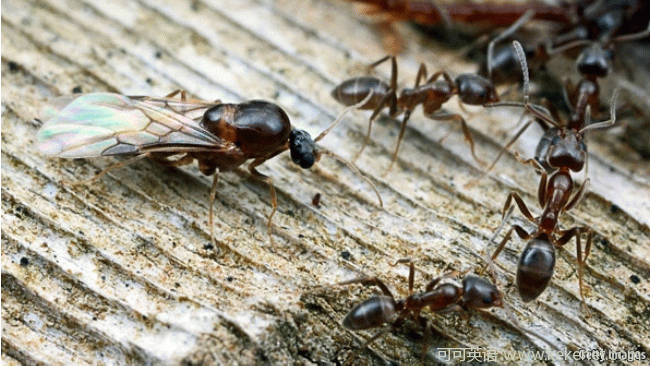(单词翻译:单击)

Science and Technolgy
科技
Invasive species
入侵物种
Boom and bust
繁衍与湮灭
Invasive Argentine ants may be less persistent than once feared
入侵性阿根廷蚂蚁可能没有想象的那么可怕
DESPITE their name, Argentine ants are a well-travelled lot. Human commerce has allowed them to hitch rides from their homeland to every continent on the planet, with the exception of Antarctica. And when they arrive, they often thrive. At least 15 countries now host colonies, which frequently prosper at the expense of native species. This flexibility, combined with an aggressive temperament, makes them one of the world's best-known and most-hated invasive species.
如果不顾它们的恶名,阿根廷蚂蚁可以说是很好的旅行家。人类的商业活动将它们带到了世界各大洲,南极洲除外。并且当它们到达时,它们就会繁衍。目前,至少15个国家受到外来物种的入侵,这种入侵是以牺牲本土物种为代价的。这种侵略性及适应性使得它们成为世界上最著名同时也是最令人深恶痛绝的入侵物种。
Yet, as any general knows, establishing a beachhead is not the same thing as conducting a successful, long-term occupation. Argentine-ant colonies sometimes collapse suddenly, and with no obvious explanation. In a paper just published in Biology Letters, a group of researchers at Victoria University of Wellington, in New Zealand, led by Meghan Cooling and Phil Lester, describe their attempts to study such disappearances systematically.
但是,众所周知,建立一个滩头阵地不同于成功地进行一次长期占领。阿根廷蚂蚁的入侵有时突然毫无缘由地停止。在最近发表在《生物书简》(Biology Letters)上的一篇文章中,新西兰惠灵顿维多利亚大学(Victoria University of Wellington)的一组研究人员——由梅根?库灵(Meghan Cooling)和菲尔?莱斯特(Phil Lester)领导——描述了他们对这种系统性消失的研究。
The researchers examined 150 sites across the country where Argentine-ant nests had been recorded. At 40% of them they found that the ants had vanished. At many of the other sites, ant numbers were much reduced, with areas that once sported dozens of nests over hundreds of hectares reduced to just one or two colonies covering much smaller tracts of land. And with the invaders gone, native ants seemed to be re-establishing themselves, suggesting that the Argentine ants' impact on biodiversity had been transient, rather than permanent.
研究者们考察了全国范围内150个已经被记录下来的阿根廷蚂蚁据点。他们发现其中的40%已经消失,而在其他的据点,蚂蚁数量减少,原来几百公顷的面积上有几十个蚁巢,而现在一片小面积土地上只有一两个聚居群。随着侵略者离开,本土蚂蚁似乎在重建自己的种群,这表明阿根廷蚂蚁对生物多样性的影响只是暂时的。
A statistical analysis of the data yielded an estimate for the likely survival time of a typical colony of between 12.9 and 15.3 years, and suggested that warm and dry conditions were more favourable for survival than cold, wet ones. Exactly what caused the collapses is still not clear, although the researchers suspect that unfamiliar diseases may have played a role.
数据统计分析估测了一个典型的聚居群(12.9—15.3年)可能的生存时间。该分析也表明,比起寒冷潮湿的条件,温暖干燥的环境更有利于生存。尽管研究者们怀疑不熟悉的疾病可能起到了一定作用,但导致阿根廷蚂蚁消失的确切原因尚不清楚。
Unity is not strength
团结不是力量
It is a plausible theory. Because they grew from a small number of founder colonies, or possibly even a single one, New Zealand's Argentine ants are genetically similar to one another (the same is true of most infestations outside the ants' homeland). That may be one reason for their success: ant researchers hypothesise that, being so closely related, the individual insects are unable to distinguish their nest mates from members of other colonies, which causes ants from different nests to co-operate as if they were kin, and has led students of the field to speak not of hundreds of individual infestations, but of a single, country-spanning "super-colony".
这种理论可信。因为它们是从很小的群体(或者可能是单一个体)发展起来的,新西兰的阿根廷蚂蚁之间的基因非常相似(蚁巢以外的侵扰也同样具有该特点)。这也许是它们成功的原因之一:蚂蚁研究者假定,关系紧密的个体昆虫不能够把同巢穴的同伴同其它聚居区的成员区分开来,这导致来自不同巢穴的蚂蚁就像亲戚一样相互合作。这使得这一领域的学者不再谈及成百的个体侵扰,而是谈及单一的、跨越全国的"超级群体"。
But a shallow gene pool can be a weakness, too. If one nest proves susceptible to some environmental factor-be it disease, predation, or even a cold snap or wet spell-then it is likely that all the other colonies will share that vulnerability.
但是,一个浅薄的基因库也可能是一个弱点。如果一个巢穴容易受到某些环境因素的影响——不管是疾病、掠食,亦或是寒流、潮湿期——那么极可能其他的聚居群也有着同样的弱点。
Now that they have documented the extent of the collapse the next step, says Ms Cooling, is to test the hypothesis of genetic vulnerability and try to work out precisely what causes the sudden reversals of formicine fortune she has seen. And it is not just ecologists who will be waiting for the results. New Zealand's government had reckoned it might have to spend NZ$68m ($53m) a year keeping the newcomers under control. If Mother Nature can do the job instead, then it would represent a tidy saving for the country's exchequer.
库灵表示,他们现在已经记载了蚁群消失的范围,下一步是验证基因脆弱性这一假设,并努力找出导致蚁群突然转变的确切原因。而等待这一结果的不止是生态学家。新西兰政府估计,每年可能会花掉NZ$68m(合$53m)用于控制新物种的入侵。如果自然母亲能够完成这项工作,那将会为国库省下一大笔资金。


